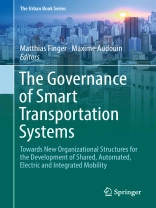This book presents essential new governance structures to embrace and regulate smart mobility modes. Drawing on a range of case studies, it paves the way for new approaches to governing future transportation systems.
Over the past decades, Information and Communication Technologies have enabled the development of new mobility solutions that have completely redefined traditional and well-established urban transportation systems. Urban transportation systems are evolving dramatically, from the development of shared mobility modes, to the advent of electric mobility, and from the automated mobility trend to the rapid spread of integrated transportation schemes. Given the disruptive nature of those new mobility solutions, new governance structures are needed. Through a series of case studies from around the world, this book highlights governance and regulatory processes having supported, or sometimes prevented, the development and implementation ofsmart mobility solutions (shared, automated, electric, integrated).
The combination of chapters offers a comprehensive overview of the different research endeavours focusing on the governance of smart transportation systems and will help pave the way for this important subject, which is crucial for the future of cities.
Mục lục
Introduction.- Part I: Governance of Shared Mobility.- Regulating Transport Platforms: The Case of Carpooling in Europe.- Regulating of TNCs in Latin America: The Case of UBER Regulation in Mexico city and Bogota.- Governing Carsharing as a Commercial or a Public Service? A Comparison between France and Japan.- Part II: Governance of Automated Mobility.- Data-led Governance of Self-driving Vehicles for Urban Shared Mobility.- How Should We Drive Self-driving Vehicles? Anticipation and Collective Imagination in Planning of Mobility Futures.












